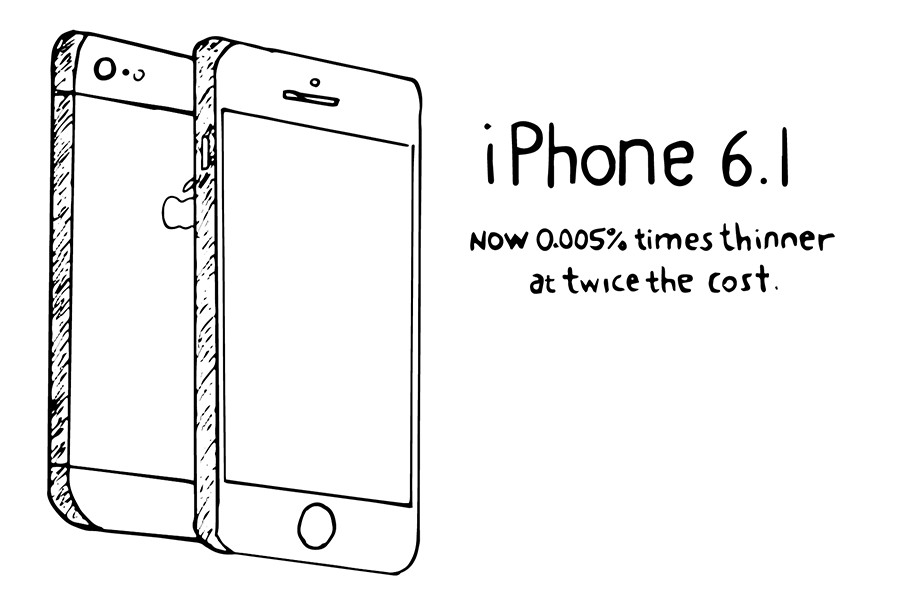Borde: Limit buying electronics to when it is necessary
May 9, 2016
Technology is ubiquitous in our lives, and it’s easy to take our gadgets for granted. In 2013 alone, over 80 percent of American households reported having a computer of some sort. However, we consumers need to be aware of the environmental costs of producing electronic devices and limit our consumption of them accordingly.
It is important to buy products that will last a long time. Unfortunately, many of the gadgets in our lives today are easier to replace than they are to fix. Apple’s enormously popular MacBook laptops have proprietary internal components which make replacement parts difficult to source. For example, both their RAM and display are soldered into the body, making them easier to replace than repair. Apple’s competitors are no different: When I cracked the screen on my Samsung Galaxy S4 last quarter, I learned it was cheaper to get a new phone than to spend the time and money to fix the screen on my old phone with outdated parts.
Unfortunately, phone carriers always make it seem profitable and beneficial to upgrade phones even when your current model is working perfectly fine. Carriers such as Sprint and Verizon will let you get a new model of a phone for a fraction of the phone’s sticker price just for signing a contract with them. On the surface, this promotion seems like a good deal for everyone: The consumer gets a brand-new phone, the phone manufacturer sells more products and the carrier gets two more years of business with the consumer.
However, promotions like these are terrible for the environment. They give consumers an incentive to purchase new technology even when their current gadgets work just fine. The problem is not the promotion itself, but the reinforcement of buying new gadgets even when it is not essential.

Cartoon by Lisa Chen/The Daily Northwestern
We need to reduce our consumption of unnecessary gadgets because getting rid of them is a difficult and inefficient process. Consumers throw out nearly 41 million tons of e-waste each year. The majority of this e-waste is not recycled but is redirected to landfills where toxic elements such as lead, mercury and cadmium leak out and poison the surroundings.
Even worse, the burden of dealing with unwanted electronics often falls on parts of the world that don’t receive the benefits of the technology. 90 percent of e-waste is illegally dumped and traded, particularly to developing countries that do not have protocols to dispose of e-waste safely. Guiyu, China, nicknamed the “Electronic Wastebasket of the World,” processes over 15,000 tons of e-waste in 5,000 workshops every single day. Unsurprisingly, the city had 82 percent of children test positive for unsafe levels of lead in their blood.
The consequences of our purchases are not always obvious, but that does not mean we should be oblivious to them. Even though very few people have the skills and resources to make their own electronics, there are some actions that all consumers can take. Instead of jumping to purchase the newest smartphone, tablet or gaming device that comes out every year, try to use the current edition you have until you can’t anymore. Resist the holiday season’s low prices and your cell phone carrier’s upgrade options. New shiny gadgets that are easy on your wallet aren’t usually that nice to the environment.
Replacing electronics is sometimes absolutely necessary. And when this is the case, it is crucial to dispose of old gadgets responsibly. Evanston has designated drop-off programs that reclaim usable parts from old equipment and responsibly recycle the rest. Best Buy and RadioShack make this easy to do and sometimes even pay you for your e-waste.
Although it requires effort, it’s important to resist the convenient option of tossing your electronics in the trash. More importantly, if your gadgets aren’t broke, don’t replace them.
Akash Borde is a McCormick freshman. He can be contacted at [email protected]. If you would like to respond publicly to this column, send a Letter to the Editor to [email protected]. The views expressed in this piece do not necessarily reflect the views of all staff members of The Daily Northwestern.












